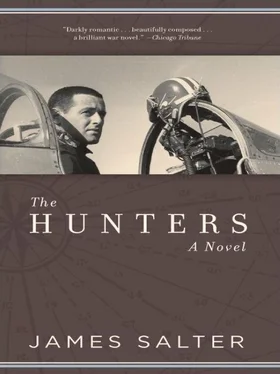“Sure. That’s all right.”
“One of the hardest things in life is to separate the details from the important points. In this case, the coach part is incidental. History will remember you as an arithmetic teacher and ignore the incidentals.”
“That’s very interesting,” Cleve said. “You’re not by any chance a history teacher, are you?”
“Me? A teacher?”
“Why not?”
“I’m a wop,” DeLeo said, smiling broadly, “that’s all; but let’s face it, incidentally there’s a little bagel in me, too.”
DeLeo came from a tough mining town in West Virginia. He was one of those men who seem to have arisen from a place spontaneously, with neither family nor enduring friends having marked his growth. He would shrug when asked what he had done before being in the service. It was authentic. He seemed to be completely independent of obligations.
Daughters was different, a man enmeshed in the complexities of life, thin and preoccupied. He was about the same age as DeLeo: they were both in their late twenties. Daughters had flown during the last war, but his only overseas service had been in Iceland, and he had not seen any combat. He had been discharged and had coached and taught in a high school in New Mexico. He had a wife and three small sons there. As a reserve officer, he had been recalled to the service in 1950, and he was fulfilling his duties without complaint, but also without any soaring enthusiasm. He wrote long, regular letters home. He had flown thirty-one missions when Cleve took over the flight. DeLeo had twenty. The two second lieutenants had not flown any.
“There’s your real problem,” DeLeo said, waving his hand toward them casually, “the air cadets.”
“Aw,” Billy Lee Hunter protested.
He was tall and husky, a Texas boy shining with artlessness. He was just out of gunnery school. In his home town the proud parents read his letters to all the neighbors and other folk around.
“I don’t mind being kidded,” Hunter went on, “but I surely am anxious to start flying missions.”
“The same for me, too, sir,” Pettibone added. He was the other second lieutenant. His cheeks looked as if they had been slapped into rosiness, and his fine hair was like a cap of gold.
Both of them had been sitting quietly side by side since Cleve had come in, like two spinsters at a cocktail party, listening to the conversation but saying nothing, a partially empty beer can in front of each. Now they eagerly took the opportunity to talk.
“They surely do ride us a lot,” Hunter explained innocently, “but I suppose they had to take it out on somebody. We notice this flight doesn’t have one MIG to its credit.”
“Listen to the assassins,” DeLeo said. “Don’t talk too much before you know what it’s like. You may end up wishing your mouth had been a little smaller.”
Hunter reddened.
“Maybe,” he replied.
That the flight had no claims, though, they were all conscious of. Robey’s, in the room adjoining, was heavy with victories, eight altogether, Robey’s five and three others. On the other side was Nolan’s flight with four. Nolan had two of them. The contrast was marked for a flight between them with none. It was understood that Cleve had been installed to change this.
He finished putting his things away as well as he could and sat down on his cot. He was satisfied. He had a feeling of liking them all and of being liked. It was a rich infusion. They would make a name for themselves together. The opportunity to do that, to start fresh, from nothing, was everything he could have asked for. He retreated from reality as he considered it. He was not too concerned with how competent they were as flyers. He would make them good if he liked them well enough, if he loved them; and as they sat with each other in the darkening room about which winter hung, the confidence that he would find it all possible flooded over him. It was an effort to remain silent with this exhilaration inside him. It would all come in time, he was certain.
After a while they walked down to dinner together, passing by figures in the bleak evening that spoke out to greet DeLeo and Daughters. Cleve did not recognize any of them. The awkwardness of being a newcomer still nipped at him. They decided to stop at the club for a drink. The second lieutenants tagged along dutifully, although they did not drink anything stronger than beer.
The bar was crowded. Robey was there, sitting at a table with four or five others and rolling dice for drinks. They were still talking about his last kill, warming him with attention. He received it passively; but there was an aura surrounding him, a cloak of satisfaction. He had been transmuted. He was more than just himself, he was symbolic, as when the sleekness of his ship and the completeness of his equipment so enveloped him that, to a person as near as a wingman or far as a mechanic watching him climb out of sight, he inherited the beauty of his machine.
They sat at the bar. The room was small, and with the doors and windows closed voices crossed it easily. They could hear Robey among the others from time to time. DeLeo made an expression of distaste.
“Listen to that,” he said, motioning with his head, “the ace, telling them all about it. That’s what we’ll have to listen to from now on.”
“Maybe you can pick up some pointers,” Daughters suggested.
“On what? Debriefing?”
“Let’s call it enterprise. After all, he’s made a name for himself.”
“You bet he has. His mother wouldn’t recognize it, either.”
The lieutenants, one on each side of Cleve, were talking earnestly to him about when they could start their missions. They had both finished their training phase two days before.
“Do you think we’ll get a chance to fly a mission soon, sir?”
“Maybe tomorrow.”
“Tomorrow? For a fact now?”
“That’s no promise. We’ll see how things are.”
“It’s not easy to sit around and, well, you heard.”
“Don’t take it so seriously” Cleve said.
“I just want a chance to show certain people that maybe they were wrong about a few things, that’s all.”
“You’ll get your chance.”
“When I was freshman, we didn’t mind stuff like this. Or in cadets. You expect it then.”
“Where did you go to college?”
“The University of Texas.”
Cleve nodded.
“They act like they own the war just because they’ve flown twenty or thirty missions,” Hunter said.
“That’s right,” Pettibone added.
“What do they think we are?” Hunter complained.
“A couple of freshmen, I guess,” Cleve said. “Three, actually. Minus the little caps.”
“Oh, they won’t try it with you.”
“In a couple of months you’ll be doing the same thing with the new boys. It takes a little while to become a veteran, that’s all. Twenty or thirty missions, it looks like.” He smiled inwardly as he said it. Desmond had been right. He was talking like one himself, already.
There was singing going on. Robey had organized three tables, and the room was flooded with noise which abated only slightly as they made the transition from one roaring favorite to another. Even DeLeo joined in. The songs were common property. When Colonel Imil entered, there were waves and shouts of acclaim. He stood grinning. His singing was confined to a mouthing of lyrics, but he always took part. It represented to him the qualities he liked to see in his pilots, and nothing was more important to him than they were. They made a wing, he claimed, and to have a great wing, one the glories of which would become legend, was Imil’s honest objective. He allowed no other consideration, even selfish, to contend. In this respect he was a valuable commander. Everything was subordinate to the good of the wing.
Читать дальше












